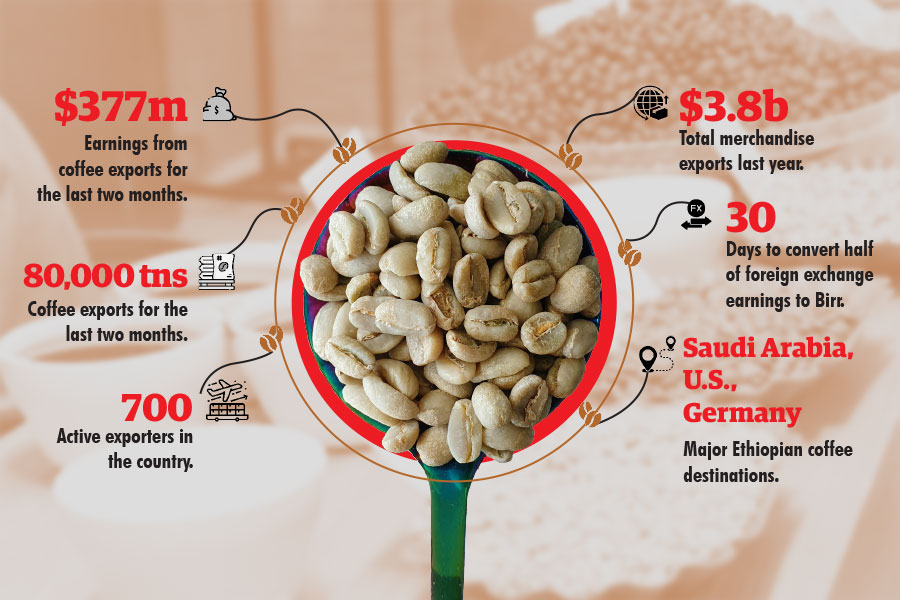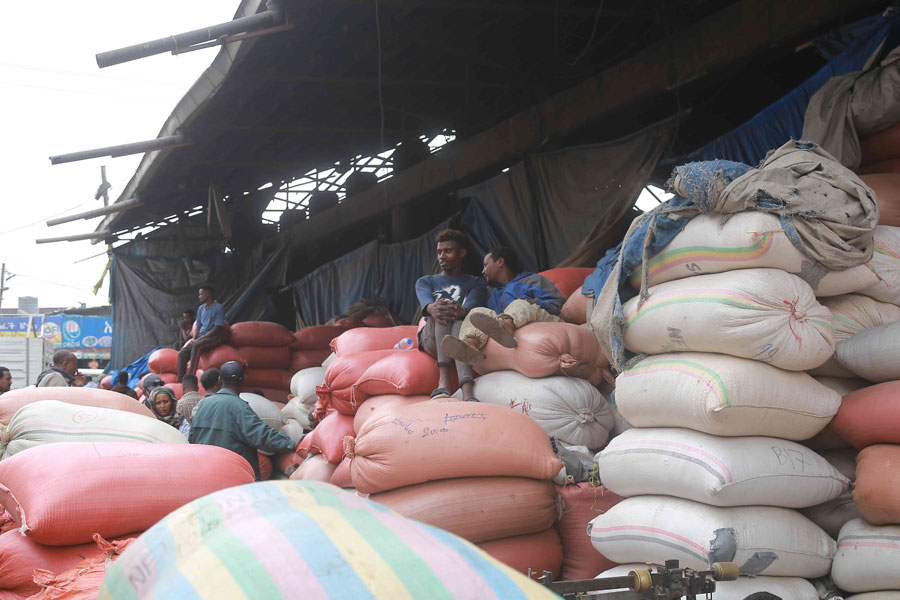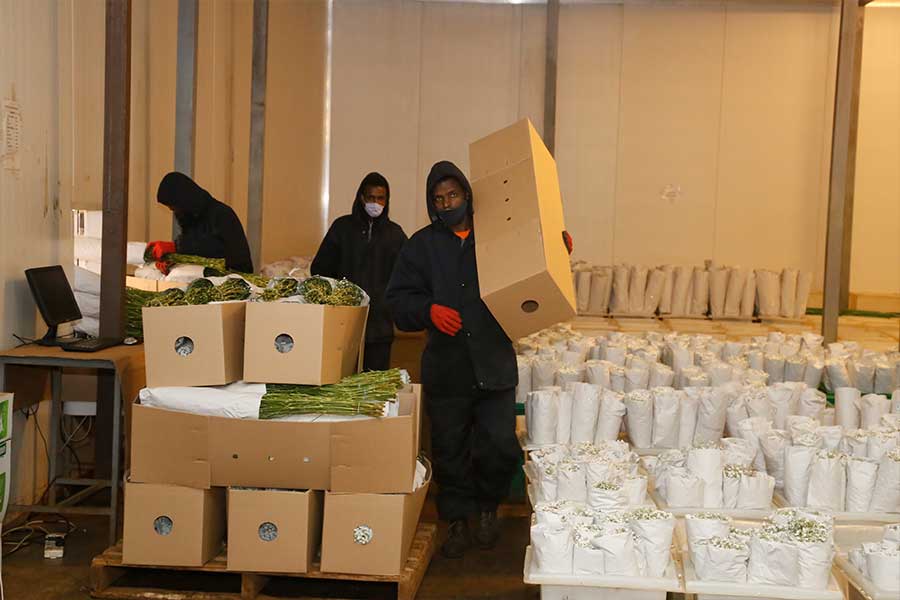
Radar | Nov 11,2023
Amidst the teff price reaching an all-time high, Injera exporters are hoping for a minimum floor price adjustment to use as a springboard for increasing prices to overseas markets.
Under the Injera Bakers & Exporters Association, eight companies have reached out to the Food & Beverage Industry Research & Development Centre this March to conduct a study that considers keeping their profit margins while maintaining the relationship with international buyers.
The central bank set the price floor for Canadian and US markets to 1.20 dollars and 1.35 dollars respectively last year. However, exporters cite the skyrocketing price of teff which hovers around 10,000 Br for a quintal coupled with logistic hurdles as a ground for an adjustment.
Tewedros Asres, head of the Association, believes a floor adjustment will serve exporters engaged in cutthroat competition and focus on quality to penetrate the market.
"The price of teff has doubled since then," he said.
The Centre conducts studies and forwards a recommendation to food and beverage industries with hopes of addressing their concerns. Considering the economic conditions and current business climate it has completed a two-month study which will be up for discussion with stakeholders this week.
According to Bekele Mekuria, general manager, the study suggests setting a price floor for countries in the Middle East and Europe which were not included before. He said the price floor should include all destinations while the amount will be based on their respective distances.
"This would help them make a profit," said Bekele.
He believes setting a floor price for exports helps increase foreign currency earnings.
Injera exports have garnered 28 million dollars in the past eight months, according to Minster of Industry Melaku Alebel.
A quintal of Teff yields close to 800 pieces of Injera and is sold at prices depending on the quantity of order, quality of the injera and shipping costs with the United States being the number one importer.
According to data from the Ethiopian Statistics Services, over 56 million quintals of teff were harvested from 2.9 million hectares of land, with Amhara and Oromia regional states contributing more than half. The transport hurdles at the borders of the regional states were cited as a major factor for the increased price of teff in the local markets.
Solomon Shibabaw is one of the exporters who joined the business four years ago with 10 million Br capital. His company Tabsiya Food Manufacturing Plc ships up to 2,000Kg to the US market six days a week.
He claims to produce 700 pieces of Injera from a quintal and uses cargo shipments to reach distributors without compromising quality.
While he does not face a supply shortage, Solomon observes that his earnings are dwindling due to the surging utilities, labour and rental costs. He fears that the business will stop making a profit altogether if the expenses are not met with proportional income.
Economists like Alemayehu Geda do not believe the forex earnings from such exports are significant compared to other commodities.
Despite the desperate attempt to garner foreign currency, Alemayehu agrees that setting a floor price on exported items increases the amount of earnings for the federal government while helping exporters get better prices.
The exporters also voiced concerns regarding supply and foreign currency shortages and power disruption during a discussion that aimed to give platform to connect the private sector with the government officials.
A representative from the Injera Bakers & Exporters Association, Rahel Moges stressed that the recurring input shortage should be addressed by the Ministry of Agriculture officials at the event held at Skylight Hotel, Africa Avenue (Bole Road) last week.
It was organised by the Pan African Chamber of Commerce & Industry, the Ministry of Trade & Regional Integration and the Ethiopian Chamber of Commerce.
Attendees included representatives from the Ethiopian Meat Producers-Exporters and Ethiopian Pulses, Oil Seeds & Spices Processors & Exporters associations.
Lack of demand for locally processed foods, weak export market, inadequate finance, absence of modern facilities, lack of tax incentives and shortage of foreign currency were identified as hurdles during the presentation by Haymanot Tibebu, the advisor at the Pan African Chamber of Commerce & Industry.
She recommended strong public-private partnerships, particularly with food processors that add value to the products through advanced production and packaging technology.
PUBLISHED ON
Jul 29,2023 [ VOL
24 , NO
1213]

Radar | Nov 11,2023

Fortune News | Oct 13,2024

Fortune News | Mar 05,2022

Fortune News | Aug 20,2022

Fortune News | Jan 01,2023

Fortune News | Mar 11,2023

Agenda | Mar 04,2023

Editorial | Jun 12,2021

Radar | May 28,2022

Fortune News | Mar 05,2022

Dec 22 , 2024 . By TIZITA SHEWAFERAW
Charged with transforming colossal state-owned enterprises into modern and competitiv...

Aug 18 , 2024 . By AKSAH ITALO
Although predictable Yonas Zerihun's job in the ride-hailing service is not immune to...

Jul 28 , 2024 . By TIZITA SHEWAFERAW
Unhabitual, perhaps too many, Samuel Gebreyohannes, 38, used to occasionally enjoy a couple of beers at breakfast. However, he recently swit...

Jul 13 , 2024 . By AKSAH ITALO
Investors who rely on tractors, trucks, and field vehicles for commuting, transporting commodities, and f...

Nov 1 , 2025
The National Bank of Ethiopia (NBE) issued a statement two weeks ago that appeared to...

Oct 25 , 2025
The regulatory machinery is on overdrive. In only two years, no fewer than 35 new pro...

Oct 18 , 2025
The political establishment, notably the ruling party and its top brass, has become p...

Oct 11 , 2025
Ladislas Farago, a roving Associated Press (AP) correspondent, arrived in Ethiopia in...